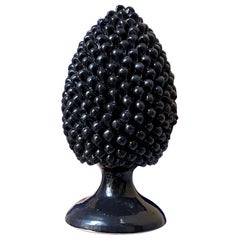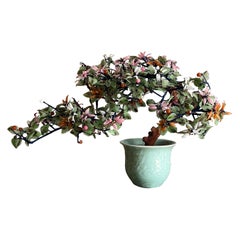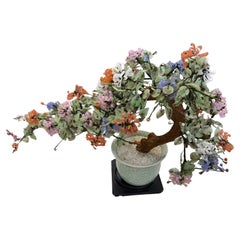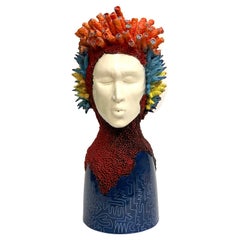Palermo Atelier Natural Specimens
to
1
1
1
1
1
1
1
2
1
1
1
1
2
1
1
1
1
1
Height
to
Width
to
2
2
2
Handmade Sicilian Ceramic Pine Nut Italian Pottery
Located in Palermo, PA
This exquisite handmade Sicilian ceramic pine nut is a timeless symbol of prosperity, good fortune, and Mediterranean heritage. Crafted by skilled artisans in Sicily, each piece is m...
Category
2010s Italian Modern Natural Specimens
Materials
Ceramic, Clay
Vintage Oriental Chrysanthemum Jade Glass Flower Bonsai Tree in Celadon Pot
Located in Palermo, PA
Chinese Republic Jade, Glass, and Hardstone Flower Bonsai Tree in Celadon Pot – Mid-20th Century
This exquisite Chinese Republic jade, glass, and hardston...
Category
Mid-20th Century Chinese Mid-Century Modern Natural Specimens
Materials
Jade
Related Items
Vintage Oriental Chrysanthemum Jade Glass Flower Bonsai Tree In Celadon
By Chinese Jesus
Located in Birmingham, AL
a Chinese Republic Jade, glass, and hardstone flower bonsai tree in a celadon pot, likely from the mid-20th century. These "Ming Trees" are known for their craftsmanship and symbolism, representing harmony, peace, and prosperity.
Materials: Jade, various hardstones, glass, and a celadon ceramic pot.
Style: Bonsai-like arrangement with cascading branches.
Flowers: Pink, white, purple, and red with yellow bead centers.
Leaves: Made of jade, agate, or glass.
Symbolism: Represents harmony, peace, and prosperity.
Value: These trees are valued for their intricate detail and artistry.
Description
This exquisite oriental bonsai tree is a stunning addition to any collection. Crafted with care and attention to detail, this Chinese chrysanthemum jade glass flower tree...
Category
Mid-20th Century Chinese Anglo-Japanese Vases and Vessels
Materials
Jade
Sea Head Water Decorative Ceramic Piece, Handmade Italy, 2021, Hand-Crafted
By Mosche Bianche
Located in San Miniato PI, IT
The piece is a unique representation of a woman's head in a modern way.
Our designer creates these pieces completely by hand.
Category
2010s Italian Modern Figurative Sculptures
Materials
Ceramic, Paint
$3,472 Sale Price / item
20% Off
H 21.66 in W 14.18 in D 14.18 in
Colorful Chimpanzee, Ceramic Centerpiece, Handmade Design in Italy, 2021
By Mosche Bianche
Located in San Miniato PI, IT
The piece is a unique representation of a Chimpanzee in a modern way.
Our designer creates these pieces completely by hand.
Category
2010s Italian Modern Animal Sculptures
Materials
Ceramic, Paint
$3,721 Sale Price / item
20% Off
H 16.54 in W 11.82 in D 13.78 in
Brass Asian Bonsai Tree Form Sculpture
Located in Bridgehampton, NY
Brass Asian Bonsai tree form sculpture.
Category
Mid-20th Century American Mid-Century Modern Sculptures
Materials
Bronze
Vintage Chinese Jade & Quartz Bonsai Tree Sculpture
Located in Plainview, NY
A vintage Chinese Jade and Quartz bonsai tree. Delicately crafted, this bonsai tree boasts beautiful and colorful leaves and petals.The flowers are made on bendable wrapped wires and...
Category
Mid-20th Century Chinoiserie Natural Specimens
Materials
Jade, Quartz
$500 Sale Price
20% Off
H 14 in W 10.75 in D 7.75 in
Mid 20th Century Carved Multi Stone Jade Bonsai Tree
Located in Chula Vista, CA
AMBIANIC presents
Vintage Multi Stone Carved Jade Bonsai Tree
Unmarked
18 h x 11 d x 21 long
Preowned original vintage
Refer to images
Category
Mid-20th Century Mid-Century Modern Abstract Sculptures
Materials
Stone
Contemporary Glass Bonsai Hand Blown Sculpture Tree Nature Zen Calm Organic
By Simone Crestani
Located in Camisano Vicentino, IT
Introducing an exquisite Hand-Blown Glass Sculpture representing a bonsai tree, masterfully crafted by the renowned Italian artist Simone Crestani. This stunning sculpture encapsulates the delicate beauty and profound symbolism of a bonsai, capturing the essence of nature in a timeless work of art.
"The bonsai is the symbol of my work; it is the art of giving form, with respect and full understanding of what I am taking care of. The bonsai is a concentration of life, it overcomes the barrier of size and expresses strength and energy; it is a work of art that is never finished, in which nature continues to develop and evolve. I shape the material, but the end result has an identity of its own. I help it to grow and wait until it gives me an indication of the equilibrium that will allow it to express itself. With the bonsai, I am always ready to start work again, to reach a new limit, to follow a new branch of thought. It is my work that grows, slowly, with exertion and wisdom, and each day gives me life and emotions."
This hand-blown glass bonsai tree...
Category
21st Century and Contemporary Italian Modern Figurative Sculptures
Materials
Blown Glass
$3,543
H 21.66 in W 9.85 in D 11.03 in
White Lion, Ceramic Centerpiece, Handmade Design in Italy, 2021
By Mosche Bianche
Located in San Miniato PI, IT
The piece is a unique representation of a Lion in a modern way. The animal is gently painted with a cream colour.
Our designer creates these pieces completely by hand.
Category
2010s Italian Modern Animal Sculptures
Materials
Ceramic, Paint
$3,927 Sale Price / item
20% Off
H 16.54 in W 13.78 in D 13.78 in
Pair of French Midcentury Palm Tree Sculptures in Black Tapering Pots
Located in Atlanta, GA
A pair of French vintage painted tôle palm tree sculptures from the mid 20th century, with tapered pot and lion ring pulls. Created in France during the midcentury period, each of this pair of foliage sculptures depicts a palm tree planted...
Category
Mid-20th Century French Mid-Century Modern Natural Specimens
Materials
Tôle
$2,850 / set
H 18.75 in W 13 in D 12 in
Pair of Vintage Asian Green Tole Bonsai Palm Tree Sculptures
Located in Queens, NY
PAIR of Vintage Asian tole bonsai palm tree sculptures with green and gold painted leaves and trunks, mounted on oval bases. (PRICED AS PAIR)
Category
20th Century Asian Chinese Export Abstract Sculptures
Materials
Metal
French 1930s Tôle and Glass Tree in Pot Sculpture with Orange and Yellow Fruits
Located in Atlanta, GA
A French tôle and glass tree in pot from the mid 20th century, with orange and yellow fruits. Created in France during the second quarter of the 20th century, this botanical sculptur...
Category
Antique Mid-19th Century French Natural Specimens
Materials
Tôle
$3,750
H 67 in Dm 18 in
Pair of Vintage Asian Green and Gold Tole Bonsai Palm Tree Sculptures
Located in Queens, NY
PAIR of Vintage Asian tole bonsai palm tree sculptures with green and gold painted leaves and trunks, mounted in circular pot bases. (PRICED AS PAIR)
Category
20th Century Asian Chinese Export Natural Specimens
Materials
Metal



